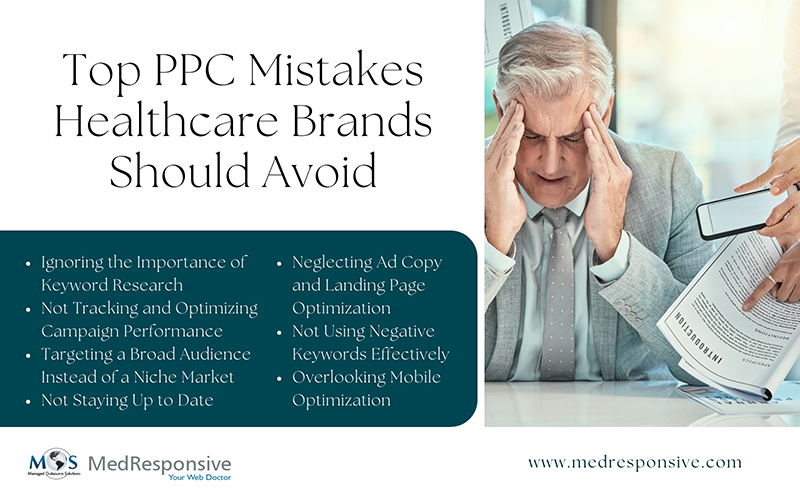In today’s digital age, healthcare organizations are increasingly turning to pay-per-click (PPC) advertising to reach potential patients. With the right strategy, medical PPC marketing can be an effective way to drive relevant traffic, increase patient acquisition, and improve return on investment (ROI). Planning PPC campaigns strategically is crucial to manage them properly. However, many healthcare providers fall victim to common PPC mistakes that can hinder the success of their campaigns. Avoiding these mistakes is crucial for maximizing the impact of your digital marketing efforts. Whether you are managing your PPC campaigns in-house or looking for external support, understanding the most common pitfalls and how to avoid them can make all the difference. This blog discusses seven most frequent paid search mistakes in healthcare marketing and how to avoid them.
Difference Between Paid Search and Display Advertising
There are two main PPC tactics – search and display advertising. Display advertising is the top-of-mind approach and involves putting out the ad (ad placement) before potential customers search, so they can recall your brand when they are ready to buy. On the other hand, paid search is a lot more intent-based, as it puts your name at the top of Google’s search results to target the right people at the right time.
So why don’t healthcare marketers just use paid search? The buyer’s journey to your site is often more complex than a single search or a single click. Both paid campaign types work together to help you reach across multiple devices in different forms along the digital patient journey. It is important to use them synergistically as part of a solid PPC strategy for best results.
Common PPC Mistakes Healthcare Brands Make
- Ignoring the Importance of Keyword Research: One of the biggest mistakes is overlooking the importance of keyword research for healthcare PPC. Targeting the right keywords is essential to ensure that your ads are shown to the right people who are actively searching for the services you provide. Medical PPC should include a comprehensive keyword strategy based on user intent, geographic location, and medical specialties. Before launching your campaign, take the time to research keywords that match your potential audience’s needs. Focus on long-tail keywords that reflect specific services, such as “best orthopedic surgeon near me” or “affordable dental implants.”
- Not Tracking and Optimizing Campaign Performance: Many healthcare organizations fail to properly track the performance of their PPC campaigns. This often results in wastage of ad costs and missed opportunities. It is not enough to simply set up ads and hope for the best. Without proper tracking, you won’t know which keywords, ads, or targeting strategies are working. Try to regularly monitor your campaigns and analyse metrics like click-through rates (CTR), conversion rates, and cost-per-click (CPC). Use tools like Google Analytics and Google Ads to track your ROI and optimize campaigns based on performance data. If you are not comfortable managing this in-house, consider outsourcing digital marketing services to a team of experts who can manage these nuances on your behalf.
- Targeting a Broad Audience Instead of a Niche Market: A major mistake in healthcare PPC marketing is targeting too broad an audience. While it may seem like reaching as many people as possible would be beneficial, this approach often leads to poor-quality leads that don’t convert into patients. Narrow your targeting by focusing on specific demographics, interests, or geographic locations. For example, if you are a fertility clinic, targeting individuals who are actively researching fertility services in your local area is far more effective than casting a wide net. Targeting the right audience for healthcare PPC allows you to reach people who are most likely to need your services and increase the chances of conversion.
- Neglecting Ad Copy and Landing Page Optimization: Effective ad copy and landing pages are crucial to the success of your PPC campaigns. In most cases, healthcare providers neglect the importance of writing compelling ads and optimizing their landing pages to match the ad’s promise. A mismatch between the ad copy and landing page can confuse potential patients and lead to high bounce rates. Therefore, ensure that your ad copy is clear, concise, and aligned with the user’s search intent. For example, if someone clicks on an ad for “affordable cosmetic surgery,” make sure the landing page reinforces that promise with relevant information and an easy way to schedule a consultation. A well-designed landing page with a strong call-to-action can significantly increase conversion rates.
- Not Using Negative Keywords Effectively: Negative keywords are an often-overlooked component of PPC campaigns as they are essential for preventing your ads from being shown to irrelevant audiences. Without negative keywords, you may end up paying for clicks from users who have no intention of becoming patients. Regularly review your search term reports to identify irrelevant keywords that are driving unnecessary traffic. For example, if you are a chiropractor, you may want to exclude keywords related to “chiropractor jobs” or “free chiropractor consultation.” By adding negative keywords to your campaigns, you can ensure your ads are shown only to those people who are actively searching for services you offer.
- Overlooking Mobile Optimization: As more people rely on mobile devices to search for healthcare services, failing to optimize your PPC campaigns for mobile can result in missed opportunities. Healthcare businesses that don’t adapt their ads, landing pages, or websites for mobile users’ risk distancing a large segment of their audience. Ensure that your PPC ads and landing pages are mobile-friendly. Test how your landing pages look and function across different devices to make sure the experience is smooth for users on smartphones and tablets. Mobile optimization for PPC campaigns can boost your conversion rates and provide a better user experience for potential patients.
- Not Staying Up to Date: The healthcare industry, and digital marketing in general, is constantly evolving. Google’s algorithm changes, new regulations regarding healthcare advertising, and other updates to PPC platforms can all impact the success of your campaigns. Not staying in the loop on these changes can hurt your performance and lead to non-compliant ads. Stay well updated on industry trends, especially changes in healthcare advertising regulations, privacy concerns, and digital marketing tools.
Paid search advertising in healthcare is a powerful tool for healthcare businesses looking to reach new patients. However, it is important to avoid common mistakes that can drain your marketing budget and reduce campaign effectiveness. By focusing on proper keyword research, audience targeting, and campaign optimization, you can achieve better results.
If your team lacks the time or expertise to manage PPC campaigns effectively, consider outsourcing to a specialized agency. A professional digital marketing agency has the expertise to craft customized medical PPC strategies that align with your goals. Such agencies can help you stay ahead of the curve, avoid costly mistakes, and ensure your campaigns are optimized for success.





